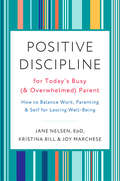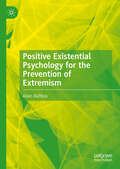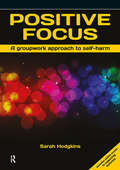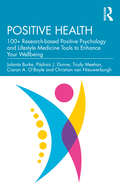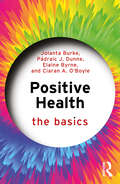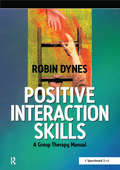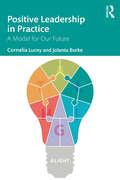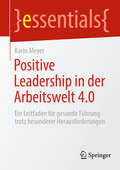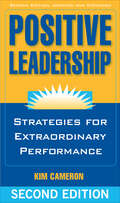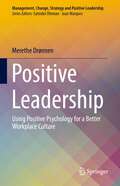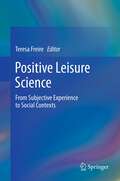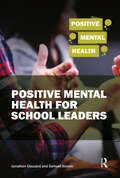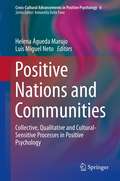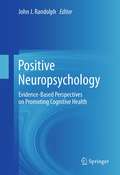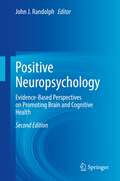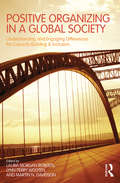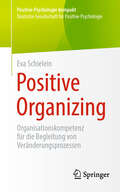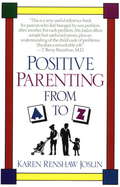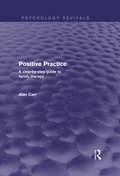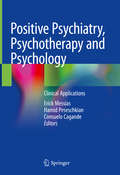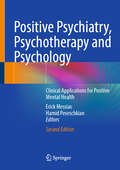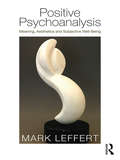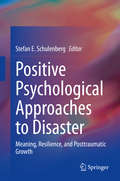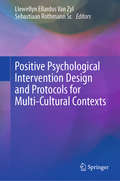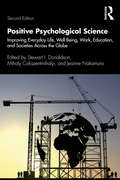- Table View
- List View
Positive Discipline for Today's Busy (and Overwhelmed) Parent: How to Balance Work, Parenting, and Self for Lasting Well-Being
by Jane Nelsen Kristina Bill Joy MarcheseWith the increasing pressure to excel at parenting, work, and personal relationships, it's easy to feel stressed and dissatisfied. This targeted Positive Discipline guide gives parents the tools to parent effectively without sacrificing their well-being or giving up on their life goals. Instead of creating unachievable expectations, you will instead learn to play to your strengths at work and at home. You’ll integrate your seemingly disparate areas of life and use Positive Discipline to make the most out of your time, energy and relationships. By helping you get to the bottom of the underlying causes of misbehavior, busy parents will also be able to avoid pampering and keep permissive and punitive parenting at bay. Instead of feeling fragmented and guilty, you’ll have the presence of mind to explore what works best for you and your family. Attitude is key – we’ll help you feel confident in your parenting abilities and your professional choices, making your children more likely to adopt an attitude of self-reliance and cooperation. Armed with communication strategies and tips for self-reflection, moms (and dads!) won't have to feel guilty about leaving their child with a sitter during the day, or leaving work early to go to a soccer game.
Positive Existential Psychology for the Prevention of Extremism
by Alain RuffionMany scientific works and studies have focused on the phenomena of extremism and violent radicalization. However, very few resources exist to effectively address this issue from an educational perspective. The diagnoses are often fragmented and give prominence to geopolitical and socio-political factors. Yet an interdisciplinary analysis of the processes of extremism and radicalization indicates the central role of biographical, psychological, or even psychopathological variables and traumas. How can we draw deep lessons from this to innovate in education and truly give ourselves the means to prevent these processes of extremism and radicalization? This book, deliberately choosing positive and existential psychology as a resource, proposes to answer this question with the support of scientific and creative resources that finally address and respond to the root causes. These resources are adapted to socio-educational professions and understandable by parents. They finally restore courage, ideas, and motivating and positive approaches for all those who want to take up this increasingly widespread and threatening challenge within our societies. At the same time, these resources make it possible to work on the transmission of values, strengths, and to contribute to the mental health and fulfilment of our youth, a capital theme if there ever was one.
Positive Focus: A Groupwork Approach to Self-Harm
by Sarah HodgkinsPositive Focus introduces a seven session group work framework which has been designed to support young people who self-harm. The group aims to encourage young people to develop alternative coping strategies for dealing with their feelings, thereby reducing the need to self-harm. Each session includes topics such as; anger/anxiety management; relaxation; assertion/communication skills; distraction/channelling; problem solving; and self-control. Group members will receive printed information from the sessions to take away with them and build into a support reference. The sessions will enhance the individual's feelings of self-control and responsibility for their actions, giving them a sense of choice about how they deal with difficult situations and feelings.
Positive Health: 100+ Research-based Positive Psychology and Lifestyle Medicine Tools to Enhance Your Wellbeing
by Jolanta Burke Christian van Nieuwerburgh Pádraic J. Dunne Trudy Meehan Ciaran A. O’BoyleThis comprehensive compendium offers a wealth of research-informed tools that can boost both physical and mental wellbeing throughout the lifespan. Filled with more than 100 activities to help you live life better, this book is the first of its kind to integrate the latest research from the fields of positive psychology and lifestyle medicine. Striking a careful balance between theory and practice, the book first reviews what is known about positive psychology and health, presenting a novel approach to holistic wellbeing. It then goes on to provide more than 100 tools designed to increase physical, mental and social health and wellbeing, and also to decrease the risk of illness and disease. The tools described can be used by people of all ages, whether well or experiencing illness. It includes tools that you can use to improve your nutrition and sleep, to increase your physical activity, to develop positive relationships, to develop a positive mindset and to pursue a meaning in life. These tools provide research-informed, practical advice to help you to make lasting changes and become the best possible version of yourself. This book is invaluable for anyone who wishes to maintain and enhance their health and wellbeing using tools that have been shown through research to be effective. It is also a key text for students in positive psychology and healthcare, as well serving as an evidence-based reference book for coaches and health professionals who wish to recommend research-informed tools to their clients and patients.
Positive Health: The Basics (The Basics)
by Elaine Byrne Jolanta Burke Pádraic J. Dunne Ciaran A. O’BoyleThis introductory book offers a clear guide to the new field of Positive Health which incorporates a shift towards perceiving body and mind as an integrated system. The book combines Lifestyle Medicine research and practice, such as healthy eating, good sleep hygiene, and physical activity, with positive psychology research and practice, including cognitive, arts-based, and positive affect tools, to delve into the psychology of positive health, physiology, and health behaviour.Combining theory with interventions, and illustrated by case material, mind-maps, and infographics, the book also provides exercises on how to use key research findings from the field of positive health to enhance personal wellbeing. It helps readers focus on the changes they can make to their thinking, attitudes, and behaviours, as well as changes they can instigate in their environment that can lead to positive health. Topics covered include the social determinants of health and meaning as a factor contributing to health.It is essential for introductory courses on Positive Health, and supplementary reading for courses on positive psychology or wellbeing, as well as valuable reading for all healthcare professionals and policy makers.
Positive Interaction Skills: A Group Therapy Manual
by Robin DynesThis practical, photocopiable manual provides group leaders with a flexible programme to teach interaction skills that can be adapted to a wide variety of groups, situations and needs. The programme will benefit anyone who lacks adequate skills or who has difficulty interacting with other people at home, socially or at work, for example adults with very few or no formal qualifications, people with depression or schizophrenia, young people in schools or people with learning disabilities. The book is filled with workable ideas and the sessions are designed to be used independently as required to meet identified needs. Full guidance notes for facilitators, session plans, handouts and activity guidelines are provided and this will be an invaluable resource for anyone wanting to run an interaction skills programme.
Positive Leadership in Practice: A Model for Our Future
by Jolanta Burke Cornelia LuceyThis book aims to help leaders become the best versions of themselves, achieve extraordinary results, and help their team accomplish the same. Packed with research and practical advice from real-life positive leaders, it offers an extensive look into both what high-performance leadership is and how it can be achieved. Positive Leadership in Practice is a resource that all leaders can tap into to be more effective. The book introduces an ALIGHT model that guides leaders through six fundamental resources that can alight their own and their team’s motivation and transform their performance to an extraordinary level. Further breaking down the six resources into 18 core components, the book expands on what constitutes the six resources to make them tangible and accessible. The book also offers leaders the opportunity to self-assess their own levels of resources and levels of positive leadership through a questionnaire, as well as opportunities to reflect on how to further develop these levels of resources and positive leadership. Finally, the book signposts practical strategies to tap into on the back of their reflections to take action to become their best possible positive leader. This book is for existing and aspiring managers, leaders, and those with people-related roles such as in human resources, coaching, leadership development, and organisational consultants, as well as anyone in more informal leadership positions. After all, we are all leaders.
Positive Leadership in der Arbeitswelt 4.0: Ein Leitfaden für gesunde Führung trotz besonderer Herausforderungen (essentials)
by Karin Meyer„Immer mehr, schneller und mit möglichst geringen Ressourcen“ lautet oftmals die Devise in der Arbeitswelt 4.0. Dabei ist es möglich, Unternehmens- und Mitarbeiterinteressen bestmöglich zu vereinen – also, Unternehmen (noch) erfolgreicher zu machen und gleichzeitig Wohlbefinden und Gesundheit der Mitarbeitenden zu stärken. Denn ökonomisches und soziales Wohlergehen können sich sinnvoll komplementär ergänzen. Beleuchtet werden daher wesentliche Grundlagen für Wohlbefinden, Gesundheit und unternehmerischen Erfolg – ebenso wie die Umsetzung in die Praxis mittels Positive Leadership gelingen kann.
Positive Leadership: Strategies for Extraordinary Performance
by Kim CameronUpdated Edition: &“Translates years of social science research into actionable guidelines for leaders who wish to make a positive difference in the world.&” —Amy C. Edmondson, Novartis Professor of Leadership and Management, Harvard Business SchoolPositive Leadership shows how to reach beyond ordinary success to achieve extraordinary effectiveness, spectacular results, and what Kim Cameron calls &“positively deviant performance&”—performance far above the norm. Citing a wide range of research in organizational behavior, medical science, and psychology as well as real-world examples, Cameron shows that to achieve exceptional success, leaders must emphasize strengths rather than simply focus on weaknesses; foster virtuous actions such as compassion, gratitude, and forgiveness; encourage contribution goals in addition to achievement goals; and enable meaningfulness in work. In this concise, inspiring, and practical guide, Cameron describes four positive leadership strategies, lays out a proven process for implementing them, and includes a self-assessment instrument. This second edition has been updated throughout with new research findings and new ideas for implementing positive leadership.
Positive Leadership: Using Positive Psychology for a Better Workplace Culture (Management, Change, Strategy and Positive Leadership)
by Merethe DrønnenThis book demonstrates how leaders can use research from positive psychology to increase work engagement and wellbeing, improve relationships, and increase performance and productivity in the workplace. Specifically, it teaches leaders how to use psychology to understand their own contributions to their leadership style as well as to understand how their employees are being motivated to increase their engagement and productivity. Suitable for leaders, human resource personnel, consultants and coaches, this book gives research-based theory and insight into how leaders’ own attitudes, mind-sets and authenticity are influencing their employees level of performance, emotions and creativity. Readers learn how to motivate, bring meaning into the workplace, improve communication and relationships as well as how to use strength-based leadership. The book features examples from successful companies like Microsoft, Google and Disney and provides practical interventions and techniques in every chapter that can immediately be implemented into the workplace.
Positive Leisure Science
by Teresa FreireThis book extends positive psychology by embedding leisure into the positive science field, following a new paradigm and aggregating various domains and fields. Positive science can be applied to the field of leisure and, in turn, leisure can serve as an arena to study some of the most important optimal functioning variables. The book presents knowledge on a diverse range of topics about optimizing socio-cognitive processes and behaviors, places and contexts, societies and cultures through leisure. These topics are unified by an underlying continuum that extends from individuals and subjective experiences to social worlds. The contributions highlight components of everyday life, showing that subjective experience and life trajectories are structured and social goals and life purposes are defined and achieved within interactions between individuals and their lived contexts and environments in daily life. .
Positive Mental Health for School Leaders (Positive Mental Health)
by Jonathan Glazzard Samuel StonesThe mental health of school leaders and managers is just as important as the well-being of those they teach and support. Recent research reveals some alarming statistics, including that 56% of senior leaders have experienced mental ill health in the last year. This book examines a range of relevant issues including workload, inspections, partnerships and approaches to leadership and management in order to address some of these concerns and provide comprehensive guidance and workable, evidence-informed strategies to support those with leadership roles in schools and colleges.
Positive Nations and Communities: Collective, Qualitative and Cultural-Sensitive Processes in Positive Psychology
by Luis Miguel Neto Helena Águeda MarujoThis book approaches the field of positive psychology from a post-modern perspective. It explores the consequences of combining current trends and models with supplementary participatory and transformative methods. The book brings a more collective, qualitative, culturally sensitive and transformative approach to the processes of making sense and implementing the science of positive psychology. It moves beyond the individual level towards a "knowledge community" and "knowledge of the communities". The book is an invitation to more participatory and polyphonic dialogues in the field of positive psychology.
Positive Neuropsychology
by John J. RandolphPsychology and many of its subfields have seen a significant shift over the past 10-12 years toward a focus on hope, positive attributes, and character strengths through the positive psychology movement. This book provides a blueprint for a burgeoning subfield in neuropsychology--positive neuropsychology. It proposes an alternative, evidence-based perspective on neuropsychology that incorporates positive psychology principles and a focus on promotion of cognitive health. It synthesizes existing research and provides novel perspectives on promotion of cognitive health in clinical, nonclinical, and academic settings. This work is a resource and reference for neuropsychologists, allied professionals, and students who see the critical role neuropsychologists can play in maintaining, promoting, and being mindful of cognitive health. TARGETED MARKET SEGMENTS Neuropsychologists, health psychologists, geriatricians, rehabilitation specialists, clinical psychologists
Positive Neuropsychology: Evidence-Based Perspectives on Promoting Brain and Cognitive Health
by John J. RandolphPositive psychology—the study and promotion of character strengths, positive emotion, optimism, and resilience—has gained considerable momentum and support over the last 20 years. More recently, neuropsychology has begun to embrace related perspectives. In the first edition of Positive Neuropsychology, an extensive collection of perspectives from national leaders in neuropsychology clarified the importance of promoting cognitive health through various means. The present edition expands on the first edition, with four new chapters and updates of all previous chapters. Topics include the importance of physical, social, and intellectual engagement across the lifespan; nutrition and brain health; novel technologies used to maintain brain health and functional independence; compensating for and preventing cognitive limitations; and strategies to promote brain health in clinical and other settings. Chapters reveal not only the benefits of understanding cognitive health and optimal outcomes across the lifespan, but also emerging avenues for practitioners to expand their work into non-traditional settings. Bringing new dimensions to the neuroscience, wellness, and positive psychology literatures, Positive Neuropsychology will interest a wide range of academics and clinicians, including neuropsychologists, clinical and health psychologists, geriatricians, primary care physicians, cognitive neuroscientists, and other healthcare professionals.
Positive Organizing in a Global Society: Understanding and Engaging Differences for Capacity Building and Inclusion
by Martin N. Davidson Laura Morgan Roberts Lynn Perry WootenThis book unites the latest research in diversity, inclusion, and positive organizational scholarship (POS), to investigate diversity and inclusion dynamics in social systems. Comprised of succinct chapters from thought leaders in the field, this book covers both micro- and macro-levels of analysis, covering topics such as authenticity, mentorship, intersectional identity work, positive deviance, resilience, resource cultivation and utilization, boundary-spanning leadership, strengths-based development, positive workplace interventions to promote well-being, inclusive strategic planning, and the role of diversity in innovation.
Positive Organizing: Organisationskompetenz für die Begleitung von Veränderungsprozessen (Positive Psychologie kompakt)
by Eva SchieleinVermittelt Ihnen Grundkenntnisse der systemischen Organisationstheorie für eine wirksame Begleitung von organisationalen Veränderungsprozessen. Mit Konzepten, die auf Menschen und ihre Psychodynamiken fokussieren, kommt man bei der Arbeit mit Organisationen nicht weit. Statt über die Grenzen der Positiven Psychologie zu lamentieren, verknüpft dieses Buch den potenzialorientierten Ansatz des Positive Organizational Scholarship (POS) mit Grundlagen der systemischen Organisationstheorie, um Transformationen in Organisationen wirksam zu begleiten. Während sich mit ‚Positive Leadership‘ bereits vor Jahren ein radikal neues Verständnis von Führung etabliert hat, definiert ‚Positive Organizing‘ den Prozess des Organisierens neu. Positive Organizing wird als Prozessmodell vorgestellt, das Berater:innen und Führungskräfte einsetzen können, um Organisationen in ihrer Fähigkeit zu stärken, selbstorganisiert und potenzialorientiert Veränderungen zu bewirken. Zu den Zielgruppen: Führungskräfte, Berater:innen, Coaches, und alle, die Veränderungen in Organisationen begleiten.
Positive Parenting from A to Z
by Karen Renshaw Joslin"A valuable book for the busy parent. Karen Joslin knows how to use both love and power in parenting, and presents easily understood solutions to common problems." GLENN AUSTIN, M.D., F.A.A.P.Former President, American Academy of PediatricsParenting expert and mother Karen Renshaw Joslin provides concrete age-specific solutions to more than 140 child misbehaviors. With this reassuring guide, alphabetically organized for easy access, you can: look up the problem and immediately pinpoint the case, learn specfically what to do, according to your child's age, know the exact words to say with actual dialogue examples, and more.From the Trade Paperback edition.
Positive Practice: A Step-by-Step Guide to Family Therapy (Psychology Revivals)
by Alan CarrOriginally published in 1995 Positive Practice is for newcomers to the field of family therapy and systemic consultation including professionals from a variety of disciplines, such as psychology, psychiatry, social work, nursing, child care and protection, occupational therapy, paediatrics and general medical practice. Positive Practice is a step-by-step approach to family therapy written both as a treatment manual and as a training resource. It describes in detail a unique approach to consulting to families with youngsters who have psychological or social problems. It covers the difficulties associated with planning the first consultation, strategies for family assessment and problem formulation, methods for developing a therapeutic contract and goal setting, plans for conducting therapy and troubleshooting resistance, and ways of concluding therapy. It includes many diagrams and checklists and is essentially jargon-free. Practical exercises are given at the end of each chapter, making it an ideal training resource for any introductory course. Special issues discussed include adjunctive individual sessions, convening network meetings, jointly managing statutory and therapeutic responsibilities, ethical decision making, clinical audit and professional development. An integrative formulation model provides a focus for both guiding assessment and planning therapy. The approach to practice described in this book offers clinicians a way to integrate new ideas from the burgeoning literature on family therapy, theory and research into their clinical work.
Positive Psychiatry, Psychotherapy and Psychology: Clinical Applications
by Erick Messias Hamid Peseschkian Consuelo CagandeFor hundreds of years, psychology has looked into the dysfunctions and symptoms of the mind. It’s only over the last few decades that the field has started to pay attention to what constitutes a functional and content life. Instead of using disease to understand health, positive psychology studies the components of a good life and helps people not only avoid mental health problems but develop happiness. The work done in positive psychology is now at a point where applications are being developed in positive psychotherapy and extended to those with psychiatric diagnoses in positive psychiatry. While these fields are a recent development they hold the promise of helping all of us live a fulfilled life. Medicine in general, and psychiatry in particular, suffers from a worldview that is symptom- and deficit-oriented. By adopting a positive approach, psychology, psychotherapy, and psychiatry add a more holistic, integrative, resource oriented, and preventive perspective. There is great urgency in developing resources and potentials in our patients, not only freeing them from their disorders. Psychiatrists and psychotherapists alike are incorporating these positive tools into their practices with positive clinical outcomes. Standing on the shoulders of pioneers like Nossrat Peseschkian, in positive psychotherapy, and Dilip Jeste, in positive psychiatry, this textbook is the first to bring together these innovations in one volume that will serve as an excellent resource for medical professionals looking to reap the benefits gained by the studies in these areas. Currently, the majority of texts that are available are targeting psychologists and researchers, whereas this book seeks to use positive psychology as the foundation on which the clinical applications are built. As such, this book will be of interest to psychiatrists, psychologists, social workers, and other mental health professionals. It may be used in educating a new generation of mental health professionals in these tenets that are expanding the reach of psychology, the practice of psychotherapy, and the scope of psychiatry.
Positive Psychiatry, Psychotherapy and Psychology: Clinical Applications for Positive Mental Health
by Erick Messias Hamid PeseschkianThis book offers a holistic, integrative, resource oriented, and preventive perspective on psychotherapy, psychiatry, and psychology. There is great urgency in developing resources and potential in our patients, not only in freeing them from their disorders. Pandemics, wars, international terrorism, climate catastrophes, escalating nationalism in numerous countries, economic crises, a pervasive distrust of governments, institutions, and even fellow citizens, along with a surge in addictive behavior towards social media, just to name a few major factors, have contributed to a notable increase in mental disorders, the prescription of psychotropic drugs, suicidality, loneliness, and depression. The fully revised and expanded second edition brings together 76 authors from 19 countries and 5 continents, who collectively share their experiences in the clinical application of positive mental health across more than 55 chapters. Twenty-two new chapters have been added, addressing emerging topics and contemporary issues. These include insights into practicing psychotherapy in Ukraine and Ethiopia, countries deeply affected by wars; multiple chapters dedicated to trauma; the Chinese perspective on navigating the Covid-19 pandemic and its effects; understanding the LGBTQ+ community; the experience of online therapy since the outbreak of the Covid-19 pandemic; and exploration of disorders such as autism, chronic pain, death and grieving, and suicide. All authors are practicing psychotherapists in their respective countries, providing firsthand accounts from their daily experiences. Additionally, all 34 chapters from the first edition have been thoroughly updated to ensure the content remains current and relevant. It remains the only international textbook which brings together positive psychiatry, positive psychotherapy, and positive psychology. Positive Psychiatry, Psychotherapy and Psychology: Clinical Applications for Positive Mental Health will be of interest to psychiatrists, psychotherapists, psychologists, social workers, and other mental health professionals. It may be used in educating a new generation of mental health professionals in these tenets that are expanding the reach of psychology, the practice of psychotherapy, and the scope of psychiatry.
Positive Psychoanalysis: Meaning, Aesthetics and Subjective Well-Being
by Mark LeffertPsychoanalysis and Psychotherapy have, in one way or another, focused on the amelioration of the negative. This has only done half the job; the other half being to actively bring Positive Experience into patients’ lives. Positive Psychoanalysis moves away from this traditional focus on negative experience and problems, and instead looks at what makes for a positive life experience, bringing a new clinical piece to what psychoanalysts do: Positive Psychoanalysis and the interdisciplinary theory and research behind it. The envelope of functions entailed in Positive Psychoanalysis is an area of Being described as Subjective Well-Being. This book identifies three particular areas of function encompassed by SWB: Personal Meaning, Aesthetics, and Desire. Mark Leffert looks at the importance of these factors in our positive experiences in everyday life, and how they are manifested in clinical psychoanalytic work. These domains of Being form the basis of chapters, each comprising an interdisciplinary discussion integrating many strands of research and argument. Leffert discusses how the areas interact with each other and how they come to bear on the care, healing, and cure that are the usual subjects of psychoanalytic treatment. He also explores how they can be represented in contemporary psychoanalytic theory. This novel work discusses and integrates research findings, phenomenology, and psychoanalytic thought that have not yet been considered together. It seeks to inform readers about these subjects and demonstrates, with clinical examples, how to incorporate them into their clinical work with the negative, helping patients not just to heal the negative but also move into essential positive aspects of living: a sense of personal meaning, aesthetic competence, and becoming a desiring being that experiences Subjective Well-Being. Drawing on ideas from across neuroscience, philosophy, and social and culture studies, this book sets out a new agenda for covering the positive in psychoanalysis. Positive Psychoanalysis will appeal to psychoanalysts and psychotherapists, neuroscientists and philosophers, as well as academics across these fields and in psychiatry, comparative literature, and literature and the mind.
Positive Psychological Approaches to Disaster: Meaning, Resilience, and Posttraumatic Growth
by Stefan E. SchulenbergWritten by prominent proponents of disaster mental health and/or positive psychology, this comprehensive book examines disaster mental health and positive psychology in the context of natural and technological disasters. Chapters in the first section focus on applications of meaning and resilience in the area of disaster mental health, both serving as primary examples of applications of positive psychology and related frameworks. Later chapters focus more specifically on key aspects of disaster mental health, including the importance of preparedness, training, and special populations. Contributors consistently align their insights with positive psychological approaches, either by explicitly referencing their relevance or alluding less directly to themes in positive psychology.Among the topics discussed:The role of religion and spirituality in finding meaning after disastersVeterans and disaster response workFirefighters: an occupational case study of resilienceStrategies for responding to adolescents following natural and technological disastersEffective crisis response for facilitating posttraumatic growthPositive Psychological Approaches to Disaster: Meaning, Resilience, and Posttraumatic Growth is a significant and timely collection of research, representing an effort of internationally respected scholars in positive psychology and disaster mental health.
Positive Psychological Intervention Design and Protocols for Multi-Cultural Contexts
by Llewellyn Ellardus Van Zyl Sebastiaan RothmannThis volume presents innovative and contemporary methodologies and intervention protocols for the enhancement of positive psychological attributes in multicultural professional and organizational contexts. Most methods, models and approaches that underpin positive psychological interventions are confined to clinical samples, closed systems or monocultural contexts, which restrict their applicability to particular contexts. Extensive practical intervention protocols, designs and methods which usually accompany first draft intervention papers are condensed into brief paragraphs in final manuscripts or removed in their entirety. This, in turn, reduces their potential for replicability or adoption by consumers, practitioners, or industry. This volume develops guidelines for enhancing positive psychological attributes, such as positive moods (e.g. positive affect; life satisfaction), strengths (e.g. gratitude; humour), cognitions (e.g. hope; optimism) and behaviours (e.g. emotional regulation; positive relationship building) within various multicultural contexts. Thereby, it shows how positive psychology interventions can be replicated to a wide-range of contexts beyond those in which they were developed.
Positive Psychological Science: Improving Everyday Life, Health, Work, Education, and Societies Across the Globe (Applied Psychology Series)
by Mihaly Csikszentmihalyi Stewart I. Donaldson Jeanne NakamuraPositive psychological science has experienced extraordinary growth over the past two decades. Research in this area is revealing new strategies and interventions for improving everyday life, health and well-being, work, education, and societies across the globe. Contributions from luminaries in the field provide excellent reviews of the selected topics, summarizing empirical evidence, describing measurement tools, and offering recommendations for improving several aspects of life. Comprehensively updated, this second edition not only incorporates the more recent empirical findings, three new chapters on relationships and love, the importance of purpose and the stimulation of education practice have been added. Focused on peer-reviewed and theory-driven psychological science, this book uniquely establishes a bridge between the intellectual movement for positive psychology and how it works in the real world. This collection of chapters will inspire the reader to creatively find new opportunities to better the human condition, whether these are in our lives, schools, health care settings or workplaces. This book will be of interest to all psychologists and social scientists, applied researchers, program designers and evaluators, educators, leaders, students, and anyone interested in applying the science of positive psychology to improve everyday life, and/or to promote social betterment and justice locally and globally.
